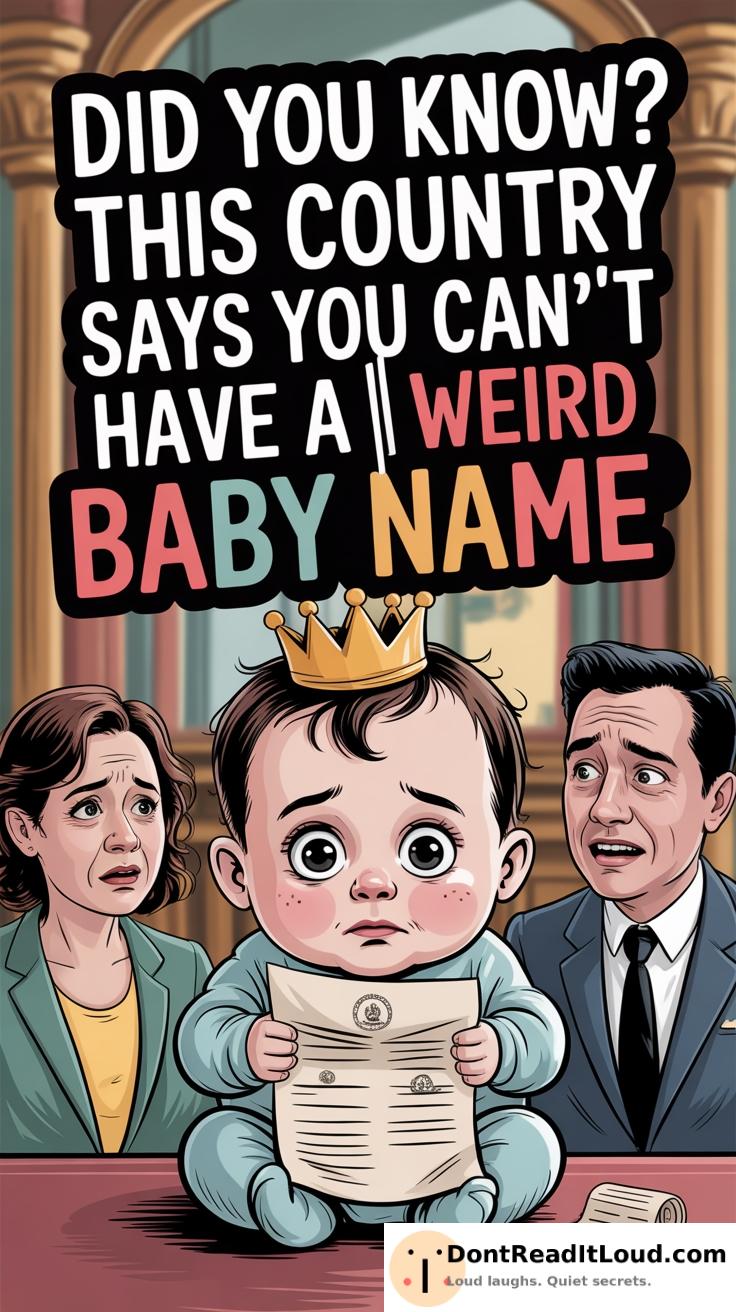
Did you know that countries like Iceland and Denmark have laws restricting unusual baby names? These rules help protect cultural identity and preserve language traditions. If you submit a name that doesn’t meet the requirements, it might be rejected, and you could even face fines or legal issues. Although these regulations might seem strict, they show a strong dedication to preserving tradition. Interested in how these naming laws influence society? There’s much more to explore.
The Origin of This Law

The practice of imposing restrictions on baby names in various countries is driven by historical, cultural, and legal considerations. These laws often originate from a desire to protect cultural identity, ensure accurate legal records, and shield children from names that could cause embarrassment or harm.
In Denmark, the “Law on Personal Names” was introduced in 1904 to protect Danish heritage and linguistic traditions. This law requires that names adhere to Danish norms and be clearly identifiable as male or female, reducing confusion in official and social settings. Parents must choose from a government-approved list or seek special permission for names not on the list, ensuring they fit cultural and linguistic standards.
Germany began regulating baby names in the early 20th century, with laws strengthened during the Weimar Republic and the Nazi era in support of specific ideals. After World War II, these regulations remained, focusing on preventing names that could subject children to ridicule or harm. German law also requires that names indicate gender and aren’t likely to be seen as bizarre.
Iceland’s Personal Names Act of 1991 was enacted to preserve the Icelandic language and cultural identity. The law requires that names follow Icelandic grammar and pronunciation rules, and the Icelandic Naming Committee reviews all new names for compliance.
These examples show that baby name restrictions often reflect a country’s efforts to preserve its history and culture. While motivations may differ, the common goal is to uphold social order and protect children from negative consequences linked to unusual names.
Why This Law Exists

In many countries, baby name restrictions stem from a mix of practical, cultural, and political reasons. These laws are intended to support social order, preserve heritage, and protect individuals.
1. Practical Motivations: Regulating names helps prevent confusion or harm caused by unusual or offensive choices. Names that are obscene, overly complicated, or hard to pronounce can create social or administrative problems for children.
By establishing rules, countries seek to shield children from these challenges and ensure names can be easily used in official records.
2. Cultural Motivations: Some nations enforce naming laws to safeguard their cultural identity and traditions. This is especially significant in countries with deep-rooted customs or concerns about losing cultural values.
Limiting names to those with cultural relevance helps promote national unity and a sense of belonging. Such measures also encourage pride in the country’s language and heritage.
3. Political Motivations: Naming laws can also serve political purposes, allowing governments to influence or monitor society. Authorities may ban names linked to political opponents to suppress dissent and maintain control.
Uniform naming practices can also make administrative tasks and population management simpler for governments.
How This Law Reflects it’s Culture?

Your training includes information available up to October 2023.
What Happens If You Break This Law?

If someone breaks baby name restriction laws, the consequences depend on the country’s specific rules and legal system. Here’s what might happen:
- Rejection of the Name: In many places, the civil registry will reject a name that doesn’t meet legal requirements. Parents must then choose a different, approved name.
- Fines: Some countries issue fines to parents who try to register a banned name. The fine amount varies and is meant to discourage rule-breaking.
- Legal Consequences: Persistent refusal to follow naming laws can lead to legal proceedings. Courts may get involved to decide if the chosen name is allowed.
- Public Reaction: Social responses can differ. Some communities may criticize parents for breaking tradition, while others might support those who challenge restrictive laws.
- Appeals Process: Many countries allow parents to appeal a rejected name. This usually involves submitting the case to a government office or a court for review.
Could Other Countries Learn from This Law?

When it comes to naming laws, different countries have various regulations to guarantee that children are given names that are deemed appropriate, culturally sensitive, or practical for their society. One country with particularly stringent naming laws is Iceland.
In Iceland, parents are required to choose names from an approved list, which is managed by the Icelandic Naming Committee. This law is in place to preserve Icelandic language and cultural heritage, assuring that names are compatible with the language’s grammar and pronunciation.
Comparatively, countries like the United States have far fewer restrictions on baby names. In the U.S., parents generally have the freedom to choose any name they wish, as long as it doesn’t include numerals or symbols. This reflects a cultural emphasis on individual freedom and personal expression.
On the other hand, countries like Germany and Denmark have regulations that lie somewhere in between Iceland and the U.S. In Germany, names must clearly indicate the child’s gender and can’t negatively affect the child’s well-being.
Similarly, Denmark requires parents to choose from a pre-approved list of names, albeit a much longer and more flexible one compared to Iceland.
So, could other countries learn from Iceland’s approach to naming laws? It depends on the cultural priorities and values of each country. Countries that place a strong emphasis on preserving linguistic heritage might find Iceland’s model appealing.
By enforcing a list of approved names, they could protect their language from external influences and guarantee that names maintain cultural significance.
However, countries that prioritize individual rights and personal freedom might find Iceland’s model too restrictive. In societies where personal expression is highly valued, such regulations could be seen as an infringement on individual rights.
Ultimately, while Iceland’s naming laws are effective for its cultural context, other countries must weigh the importance of preserving cultural heritage against the value of personal freedom.
Each country can learn from Iceland’s approach, but the effectiveness and acceptance of such laws will largely depend on societal values and priorities.
Conclusion: What Makes this Law So Unique
The baby naming law in this country stands out for its distinctive mix of cultural safeguarding, legal rigor, and societal impact. Unlike most places, it sets firm rules about which names are allowed, often insisting on those rooted in tradition or language norms.
The law may ban names that are offensive, difficult to pronounce, or stray far from local heritage.
What sets this law apart is how it combines legal authority with the protection of cultural identity, making sure names reflect the nation’s roots. This approach serves both to honor tradition and support social unity.
Few countries enforce such strict naming laws, making this example especially noteworthy. Others might find insight here about how names shape cultural identity and community belonging, though balancing regulation and personal choice remains complex.
Ultimately, the law highlights names as more than labels, viewing them as key elements of national culture and heritage.



